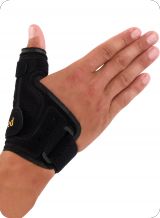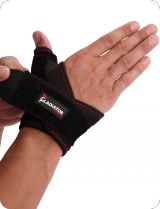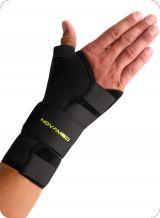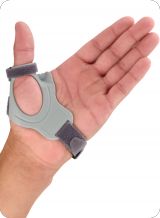Thumb - Repetitive Strain Injury
Which brace is best for you?
For your convenience we use 3 protection levels, that way you will always pick the right brace.
Level 1: Is colored green, and stands for Basic protection.
Level 2: Is colored orange, and stands for Advanced protection.
Level 3: Is colored red, and stands for Highest protection.
What's RSI?
Repetitive Strain Injury, or RSI, is a collective term for all sorts of complaints that are related with repeatedly performing the same, often small and not so strenuous movements for a long time. Bursitis and tendon sheath inflammation are disorders associated with RSI. RSI complaints vary per person, which is why a lot of cases are not treated in time. Which also affects other parts of the body. Repetitive Strain Injury consists of 3 risk phases and the longer you wait, the worse it gets.
Symptoms
RSI complaints usually arise gradually. Yet they can also occur suddenly or acutely. RSI has the following symptoms:
- Tingling hands
- A cold sensation in your forearms and hands
- A sore pain in the wrists
- Numbness in your forearms and hands
In an advanced stage, RSI also has other symptoms such as: irritation, severe pain, swelling weakness of muscles and tendons, dermal skin, loss of grip, temperature fluctuations and creaking joints.
Complaints
RSI related complaints differ per person, many cases are not treated equally and therefore not in time. This is dangerous, because over time, RSI complaints can turn into stiffening and chronic pain and spread to other parts of the body. Repetitive Strain Injury usually occurs in 3 phases:
RSI phase 1:
You will only experience pain during work related activities. Muscle cramps, local fatigue, tingling and / or numbness can also be felt. RSI complaints disappear after a period of rest.
RSI phase 2:
The pain can also be felt after work. You will feel irritation, weakness and / or loss of strength. The complaints do not disappear after a period of rest.
RSI phase 3:
In addition to the above complaints, you will also suffer from swelling, pressure pain, changes in skin color, loss of function, temperature changes and a tingling sensation. These complaints have a chronic nature.
Causes
Through the use of the computer mouse, playing with other computer equipment such as a Wii, Nintendo DS or GameBoy or frequent texting, RSI complaints arise. Other possible causes include non-specific CANS, Carpal Tunnel Syndrome, tendon and tendon sheath inflammation and bursitis. There are also less well-known causes such as, Radial Tunnel Syndrome, Cubital Tunnel Syndrome, Tendinosis, Fibromyalgia, Dystonia, Thoracic Outlet Syndrome, Shoulder Girdle Syndrome and Guyon Channel Syndrome.
This is most common among the following professions:
- Assembly workers
- Office jobs
- CAD artists
- Fine-fitters
- Installers
- Cashiers
- Factory workers
- Order pickers
- Musicians
- Hairdressers
Treatment
In most cases, Repetitive Strain Injury is difficult to treat. This is because for every person the complaints are different. Below we will discuss three treatment methods:
1. Enlist an employment expert or ergonomist
Larger companies usually employ such a specialist. One can think of an ergonomist or an internal labor expert. They can give advice and implement workplace adjustments. Smaller companies can always hire these specialists.
2. Therapies
Usually, RSI complaints never go away, but sometimes therapies can offer a solution. A number of examples below:
· Mensendieck therapy
· Cesar therapy
· Rehabilitation therapy
· Physio therapy
· Therapeutic massage
· Medical fitness
· Backstretcher & Rolastretcher
3. General advice
You can always follow advice. For example, the tips from the following specialists are useful to know.
· General Practitioner: in case of incipient complaints, contact your general practitioner immediately.
· Diet: rich in amino acids, vitamins, minerals and fatty acids.
· Rest
· Movement
Prevention
The following examples to prevent RSI complaints might be convenient for you:
- Correct posture
- Variety of activities
- Enough breaks in between your work activities
- Use of your computer mouse: try to reduce this
- Practice muscle use in a good way
- Work stress
- Special tools: think of a special kind of computer mouse or other ergonomic product
It's safe to say that when consulting specialists who often recommend products and special tools, these problems can be solved. We, at Podobrace, can offer you a wide range of products that can help to prevent or remedy this problem. Two of these products are the Super Ortho Thumb Brace CMC and the Novamed Manu Thumb Brace.













